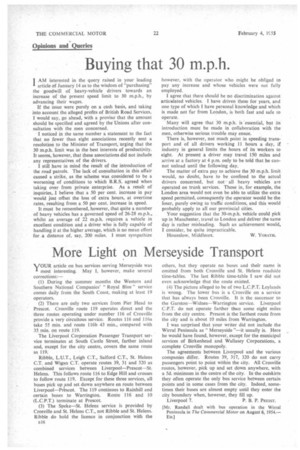Buying that 30 m.p.h.
Page 62

If you've noticed an error in this article please click here to report it so we can fix it.
I AM interested in the query raised in your leading article of January 14 as to the wisdom of "purchasing" the goodwill of heavy-vehicle drivers towards an increase of the present speed limit to 30 m.p.h., by advancing their wages.
If the issue were purely on a cash basis, and taking into account the alleged profits of British Road Services, I would say, go ahead, with a proviso that the amount should be specified and agreed by the Unions after consultation with the men concerned.
I noticed in the same number a statement to the fact that no fewer than eight associations recently sent a resolution to the Minister of Transport, urging that the 30 m.p.h. limit was in the hest interests of productivity. It seems, however, that these associations did not include any representatives of the drivers.
I still have in mind the result of the introduction of the road patrols. The lack of consultation in this affair caused a strike, as the scheme was considered to be a worsening of conditions to which B.R.S. agreed when taking over from private enterprise. As a result of inquiries, I believe that a 50 per cent. increase in pay would just offset the loss of extra hours, at overtime rates, resulting from a 50 per cent. increase in speed.
It must be remembered, however, that quite a number of heavy vehicles has a governed speed of 26-28 m.p.h., whilst an average of 22 m.p.h. requires a vehicle in excellent condition and a driver who is fully capable of handling it at the higher average, which is no mean effort for a distance of, say, 200 miles. I must sympathize however, with the operator who might be obliged to pay any increase and whose vehicles were not fully employed.
I agree that there should be no discrimination against articulated vehicles. I have driven these for years, and one type of which I have personal knowledge and which is made not far from London, is both fast and safe to operate.
Many will agree that 30 m.p.h. is essential, but its introduction must be made in collaboration with the men, otherwise serious trouble may ensue.
There is, however, not much point in speeding transport and of all drivers working 11 hours a day, if industry in general limits the hours of its workers to eight. At present a driver may travel 150 miles and arrive at a factory at 4 p.m. only to be told that he cannot unload until the following day.
The matter of extra pay to achieve the 30 m.p.h. limit would, no doubt, have to be confined to the actual drivers concerned, but not all heavy vehicles are operated on trunk services. Those in, for example, the London area would not even be able to utilize the extra speed permitted, consequently the operator would be the loser, purely owing to traffic conditions, and this would probably apply to all our provincial cities.
Your suggestion that the 30-m.p.h. vehicle could pick up in Manchester, travel to London and deliver the same day is rather misleading. Such an achievement would, I consider, be quite impracticable.
Hounslow, Middlesex. W. YORAM.




















































































































